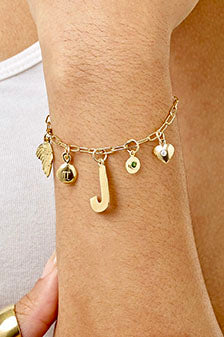Helen Ficalora
Is 14K Gold Real Gold? Here's What You Need to Know Before You Buy
When it comes to jewelry, gold is one of the most popular and sought-after materials. However, not all gold is created equal. One of the most common types of gold used in jewelry is 14K gold. But what exactly does "14K" mean, and is 14K gold considered real gold?
In this blog post, we'll dive into the world of 14K gold and explore what it is, how it compares to other gold purities, and what you need to know before making a purchase.
Understanding Gold Purity
Gold is a precious metal that is measured by its purity, which is expressed in karats (K). The karat system ranges from 0K to 24K, with 24K being the purest form of gold.
- 24K gold is considered pure gold, with a purity of 99.9%.
- 18K gold is 75% pure gold.
- 14K gold is 58.3% pure gold.
- 10K gold is 41.7% pure gold.
The remaining percentage in lower-karat gold is made up of other metals, such as copper, silver, or zinc, which are added to increase the metal's durability and strength.
Is 14K Gold Real Gold?
Yes, 14K gold is considered real gold. While it's not as pure as 24K gold, it still contains a significant amount of the precious metal. The 14K designation means that the gold alloy is composed of 58.3% pure gold and 41.7% other metals, such as copper, silver, or zinc.
The addition of these other metals serves a few important purposes:
-
Durability: Pure gold is a very soft metal, making it prone to scratches, dents, and bending. The alloyed metals in 14K gold help to increase the metal's overall strength and durability, making it more suitable for everyday wear.
-
Color: The other metals added to 14K gold can also affect the color of the final product. 14K gold typically has a slightly reddish or yellowish hue, compared to the more vibrant yellow of 24K gold.
-
Cost: Because 14K gold contains less pure gold than 24K, it is generally more affordable, making it a popular choice for those looking to purchase gold jewelry on a budget.
14K Gold vs. Other Gold Purities
When it comes to choosing the right gold purity for your jewelry, there are a few key factors to consider:
14K Gold vs. 18K Gold
- 18K gold is considered a higher-quality gold, with a purity of 75%. It has a brighter, more vibrant yellow color and is more valuable than 14K gold.
- 14K gold is more durable and less prone to scratches and dents, making it a better choice for everyday wear.
- 14K gold is generally more affordable than 18K gold.
14K Gold vs. 10K Gold
- 10K gold has a lower gold content, with a purity of only 41.7%. It is less valuable and has a duller, more muted color compared to 14K gold.
- 10K gold is more affordable than 14K gold, but it is also less durable and more prone to wear and tear over time.
- 14K gold is a better choice for those looking for a balance of quality, durability, and value.
14K Gold vs. 24K Gold
- 24K gold is the purest form of gold, with a purity of 99.9%. It has a vibrant, rich yellow color and is the most valuable type of gold.
- 24K gold is extremely soft and malleable, making it less suitable for everyday wear and jewelry. It is more commonly used for investment purposes or in high-end, specialized jewelry.
- 14K gold is a more practical choice for everyday jewelry, as it offers a balance of durability, color, and value.
Caring for 14K Gold Jewelry
While 14K gold is more durable than pure gold, it still requires proper care and maintenance to keep it looking its best. Here are some tips for caring for your 14K gold jewelry:
- Clean your jewelry regularly using a mild soap and warm water. Avoid using harsh chemicals or abrasives, which can damage the metal.
- Store your jewelry in a cool, dry place, away from direct sunlight or moisture, which can cause the metal to tarnish.
- Remove your jewelry when engaging in activities that could potentially damage it, such as swimming, exercising, or doing household chores.
- Consider having your 14K gold jewelry professionally cleaned and inspected periodically to ensure it remains in good condition.
Conclusion
In summary, 14K gold is considered real gold, containing a significant amount of the precious metal. While it's not as pure as 24K gold, 14K gold offers a balance of quality, durability, and value that makes it a popular choice for everyday jewelry. By understanding the differences between gold purities and properly caring for your 14K gold jewelry, you can ensure that your investment will last for years to come.









